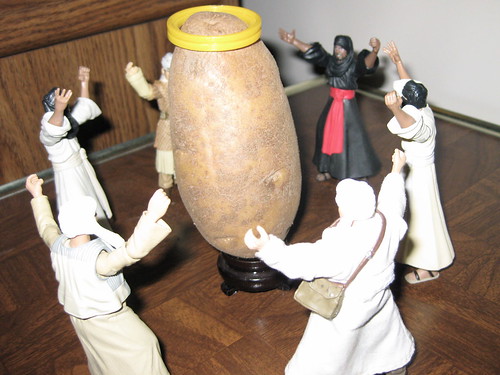leveymg
leveymg's JournalDoes this mean G-d granted dominion over the earth and the beasts of the field to the common spud?
Guess this news that potatoes have more chromosomes than people means we need to revise our understanding of humanity's place on this planet.

That's exactly how Israel got its first atomic bombs, as well. US HEU diverted from the
NUMEC plant during the 1950s and 1960s. Hundreds of kilos of the stuff, right from under our very noses - over and over, again, for years. See, Global Fissile Material Report, p 115, http://fissilematerials.org/library/gfmr10.pdf; also, S. Hersh, The Samson Option; also, http://www.nybooks.com/articles/archives/2004/may/13/israels-bomb/
The US was the Crazy Eddie of fissionable materials. Come on in - we're givin' the stuff away!
Or, if you're friends with one of our primary trading partners - let's say, Pakistan -- just tell them that King Saud sent you, and we'll set you up to you run your own global proliferation network.
Like this guy did after CIA Director GHW Bush entered into the BCCI-Safari Club deal with Saudi intel head head Prince Turki. AQ Khan - another satisfied customer! Come on down - we're givin' it away!

If you think the 917 was terrifying, can you imagine driving a mid-engine V-16 with swing axles?
Three decades before there was a McLaren M8 or the Can Am Panzerwagens, there were the Auto Union and Mercedes streamliner record cars. Prof. Ferdinand Porsche (the elder) also designed this one, below.
Would you drive on 1937 tyres at over 200 mph? Maybe if you're Tazio Nuvolari, Bernd Rosemeyer or Dick Seaman:


And, we were real happy to sell him the delivery system for tactical nukes.

Israel already had theirs, gratis:

The CIA was well aware that AQ Khan was also peddling his "previously-owned, low-miles" uranium enrichment centrifuges to Iraq and Iran in the Bush Sr. 1980s. Israel already had their bombs just-in-time for the 1967 War, thanks to us, and the ability to deliver them.
Read grandfather's career recollections: in S. America during the "Dirty War" & in Franco's Spain
Here's his end of career interview with the Foreign Affairs Oral History project in the National Archives. http://international.loc.gov/service/mss/mssmisc/mfdip/2005%20txt%20files/2004zim01.txt
He was what might be described as a typical State Dept. spook during the Cold War, except that Zimmerman was posted in Spain and ended up in Paraguay, Uruguay and Brazil during the "Dirty War." Early in the interview, he talks matter of factly about the Fascists he dealt with routinely in Spain and Portugal. His observations about Carter's attention to Human Rights are also notable for their ambivalence.
If George Zimmerman had Right-wing authoritarian attitudes (and the interview below is indeed with George's grandfather), he may have gotten them through his father who was reportedly Military Intelligence in Vietnam from his Grandfather, who was either CIA under diplomatic cover posted in some of the worst human rights violations in the world or was a career State Dept. guy in those posts who went over to CIA as a contractor at the end of his State Dept. posting. More specifically, he moved over to the "HUMINT Office of the old Intelligence Committee Staff" posted at Langley. At the very end of the interview he sums up his later career (1985-91) as being with the ARA (DOS Bureau of Inter-American Affairs). He appears to have been part of an "Inspection Corps," which may have been attached to the State Department, or that may have been his cover. But, there is no question about that he was a spook posted in some of the nastiest Spanish-speaking posts during the Cold War:
ZIMMERMANN: That is right. I really didn't have an assignment when I came back. I had interviews with the Inspection Corps, with Ken Young and also with Bill Bowdler in ARA. Bill said, "We want you to take over Brazilian affairs. You have Portuguese and we think it will be great." It looked pretty good to me, I didn't see anything else on the horizon at that point. I had not ever been in Brazil before, and I had to do my homework fast. There was an excellent Ambassador at the other end, John Crimmins. It was a great assignment and I really enjoyed it. There were many problems and it was a very busy time.
It became even busier when the office became responsible for all East Coast Affairs including Argentina, Uruguay and Paraguay. We were having problems over nuclear facilities in Brazil and the military agreements were going a little sour because of friction on nuclear matters. They also wanted a lot more military aid than we were prepared to give them at that point. Also, as I say the dirty war was going on in Argentina and Uruguay.
Q: The dirty war being?
ZIMMERMANN: The dirty war was referred to the atrocities committed by both the military government and the opposition. There were hidden massacres and burials at night that nobody knew about. People were abducted and never heard from again. People were dropped out of planes over the river. It was a very dirty war.
At one point Robert Hill was Ambassador there. I stayed with him usually when I went to Buenos Aires. I remember riding with him with four lead cars and two behind. It was that bad in terms of threats against Americans who were accused of being too sympathetic with the "opposition". It was a very dirty problem. Obviously the human rights organizations here were very much up in the air, and, of course, we were too. The Carter administration properly placed great emphasis on human rights. There was great pressure from the White House on these things.
Q: Basically you had military governments in all three countries.
ZIMMERMANN: That is true, and Stroessner had been in Paraguay since 1955.
Q: And Uruguay had a military government?
ZIMMERMANN: Yes.
Q: I think it is very interesting to look at the impact of the human rights policy during Carter on the Foreign Service and its almost visceral reaction about how this sort of upsets all sorts of other things. I think we have learned to live with it. But this was the beginning. Did you and your colleagues have trouble adjusting to this major emphasis on something... ?
ZIMMERMANN: I don't think any of us held any objection to this being a real goal in our foreign policy. I think what gave many of us problems was that it became almost the only goal in some ways. It certainly became a predominant goal and other means of achieving ends were sort of left in limbo.
Q: Did you find yourself going head-to-head with Pat Derian, head of the Human Rights office, or others in her office?
ZIMMERMANN: No, you didn't go head-to-head with Pat Derian. Our Assistant Secretary was very careful on this score. We followed his lead. Fred Rondon, who was my Argentine Desk officer and later my deputy, had the most contact with Pat Derian. In fact he accompanied her on a trip down to Argentina. He was a good man for it and was bilingual in Spanish and could help out a great deal with Pat. He also had good rapport with her, I think, given the circumstances. We took our lead from the Assistant Secretary really on how to play this.
Q: How did this translate with relations? Was it one of these things where we would go up and say you have to be more human rightish and then go on our way and nothing would happen but we had made our bid?
ZIMMERMANN: My opinion is that our representations seldom led anywhere in Uruguay or Argentina, certainly not in Argentina. In Argentina, one feels half out of the real world. There is a feeling of being isolated from world events. Certainly, they, in their own activities felt that; they didn't give a damn about opinion elsewhere.
Q: They can live off their own resources.
ZIMMERMANN: Exactly. We tried hard. I mean the violations were so egregious that it wasn't hard to be in support of human rights, believe me. The violations were incredible, including by the Tupamaros in Uruguay. We may have had a slightly restraining role in Uruguay in some cases, but not a great success.
Q: How about with Brazil and human rights?
ZIMMERMANN: Human rights was a factor in Brazil...the death squads and so forth. But violations had tapered off as an issue in some way versus what it had been earlier, and certainly Brazil in this respect was way over-shadowed by Uruguay and Argentina. But there were still problems. We got wind of violations less than we did in Argentina. Information came from interviews with people who had been released from prison some time later. Also, we had other fish to fry in Brazil, including the nuclear issue, because they were by far the most advanced in nuclear research, etc., and were dickering with the Germans.
Q: What was the issue on the nuclear side that got us so involved?
ZIMMERMANN: Well, the issue was basically what their ultimate intentions were. We discouraged the production of enriched uranium, which we tried to keep away from most countries. Were their goals just nuclear power and research or were they intent on developing military uses?
We had a similar problem with the Argentines. We were very concerned. They would not let us see their reactors except from a distance. But the issue didn't come up as sharply as it did in Brazil because Brazil was dickering with German firms for plutonium enrichment equipment and processes. In the end, the German processes did not prove very successful as I remember. I think they were systems that had not really been proved in themselves and as far as I know, did not prove to be very useful to the Brazilians either. It cost a lot of money and time and plus bad relations for a while.
Q: Brazil, unlike most of the other Latin American countries, hasn't really fought any wars with anybody for a long time. Why would it want a bomb?
ZIMMERMANN: Well, Brazil sent troops to fight with us in World War II and were the only Latin Americans that did.
Q: Yes, and they fought the Italian campaign. But you don't have a feeling that the Brazilians are after slices of territory. What would they use a bomb for?
ZIMMERMANN: Argentina. This was the big rival on the continent and they were aware that the Argentines were also pursuing nuclear development.
Q: Was it the feeling that the Argentines are messing around with nuclear things so we better have one ourselves?
ZIMMERMANN: That was the feeling on both sides, absolutely.
Q: You look at the map and you would say that you would have a real hard time making much of...they abut on each other in a relatively small area of little consequence.
ZIMMERMANN: Uruguay was established as a buffer state. I think in Brazil's case it was a little more than that, however. In Brazil it was a question of being a big power. They always wanted to be considered a big power, particularly by the US, and pointed at us and said we didn't treat them as a big power. The nuclear aspect was the mark of a big power and therefore they wanted to develop this. I think that was a very major part of the consideration.
Q: How did you evaluate our Embassies? Were we well represented in those countries?
ZIMMERMANN: Well, I think under John Crimmins the Embassy was very strong in Brazil. He was a top professional to my mind. In Uruguay, Larry Pezzulo, who was Ambassador when I left ARA, was excellent and worked very hard. His predecessor was not under the same pressures, so I think a comparison might be unfair.
In Paraguay Landau did a very good job for a number of years. I visited there twice. I flew back with the body of the Ambassador who died here and saw Stroessner a couple of times. It was a very low key operation compared with events in neighboring countries.
I think Hill did a good job in Argentina although I know he was controversial. I was never that closely involved with Raul Castro ...from Arizona I believe. I took him through his paces here before he went down, but I did not have that much of a feeling later.
Q: Carter did speak some Spanish. Was there more interest in ARA during his administration?
ZIMMERMANN: I don't know. Obviously Kennedy had an interest with his Alliance for Progress program. I think Johnson was so involved in the Vietnam business that he probably didn't have a whole lot of time for it, at least as far as I remember...I was on the Far East side at that point. I think Carter had a genuine interest in Latin America. He had Bob Pastor as his NSC guy for Latin America affairs.
Q: Did Rosalynn Carter make a trip to Latin America?
ZIMMERMANN: Yes, she went to Brazil for an inauguration that the President could not attend. I don't think the Brazilians appreciated her visit properly. I think that was unfair, but again it was the old Latin machismo. She got very involved in human rights down there too, which didn't endear her to the government.
Q: You retired when?
ZIMMERMANN: In February 1979.
Q: What have you been doing since?
ZIMMERMANN: That fall they were setting up the new FOI (Freedom of Information) office and I started working with the first team. After about a year and a half or so, Larry Pickering wanted me to join the historic document review center...it was sort of a Bangkok mafia. So I moved down there and am still working down there insofar as the salary cap permits me.
But aside from that, most of my work during the past five years has been with the Intelligence Community Staff on the HUMINT committee. That was broken up as of July under Gates. My contract is being kept alive until they decide how this settles down, whether they even want any contractors back. The HUMINT office is being moved out to Langley and the other divisions of the old Intelligence Community Staff are being parceled out elsewhere. I did mostly projects that had to do with Latin American and the Iberian Peninsula.
Q: Okay. I want to thank you very much.

Profile Information
Member since: Wed May 5, 2004, 09:44 AMNumber of posts: 36,418